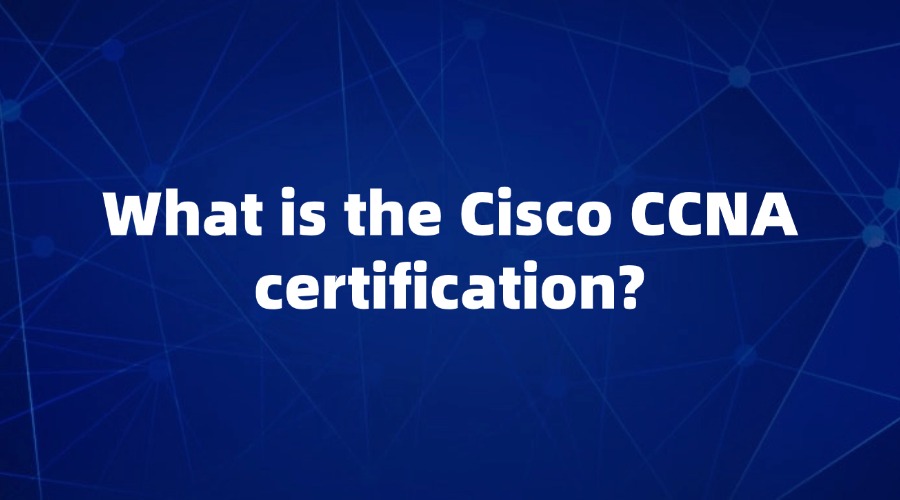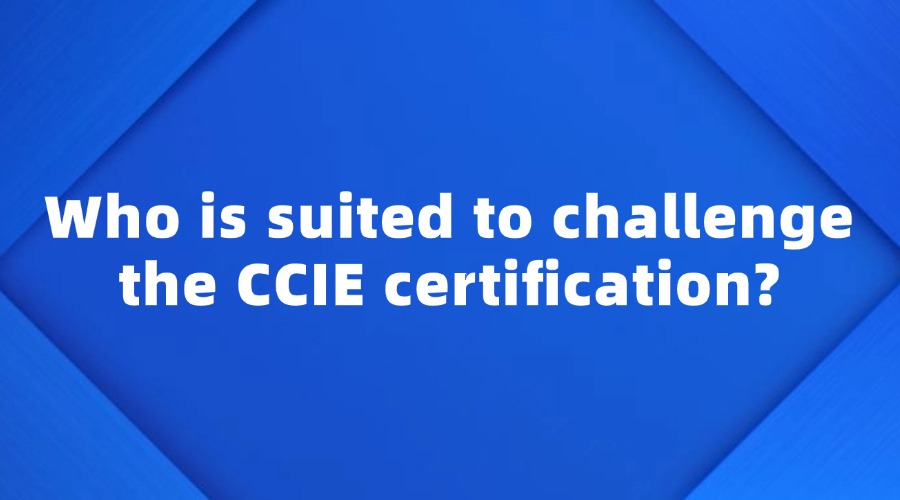What topics need to be studied for Cisco certification?
Update time:2024-11-26
If you plan to pursue Cisco certifications, it's crucial to understand what content you need to study. Cisco offers a range of certifications, such as CCNA, CCNP, and CCIE, each requiring different knowledge areas.

1. Network Fundamentals
Regardless of the certification level you pursue, mastering network fundamentals is essential. This includes:
IP Addressing and Subnetting: Understanding how IP addresses are assigned, how subnetting works, and why it's necessary. This is fundamental for network configuration, routing, and switching.
OSI Model: The OSI model divides network communication into seven layers. You need to understand the role of each layer and how they interact with each other.
TCP/IP Protocol: TCP/IP is the core protocol of the Internet. It's important to grasp its working principles, common port numbers, and data transmission processes.
Basic Configuration of Switches and Routers: Learn how to configure Cisco switches and routers, including setting IP addresses, configuring VLANs, static and dynamic routing, etc.
2. Routing and Switching
Routing and switching are central to Cisco certifications, particularly CCNA and CCNP. Key topics include:
VLAN and VTP: VLANs are virtual LANs that allow multiple logical networks within a physical network. VTP is a protocol for managing VLAN information.
STP (Spanning Tree Protocol): STP prevents loops in switch networks and is a crucial aspect of switch configuration.
Routing Protocols: Understand common routing protocols such as RIP, OSPF, and EIGRP. Each protocol has different applications and configuration methods.
NAT (Network Address Translation) and ACL (Access Control Lists): NAT allows multiple devices to access external networks using a single public IP address, while ACLs control network access permissions.
3. Security Basics
Network security is increasingly important and is covered in Cisco certification exams. Key areas include:
Firewalls and VPNs: Understand the basic configuration and function of firewalls, as well as VPN operation and setup.
Access Control: Learn to use ACLs to limit network traffic and prevent unauthorized access.
Encryption Techniques: Understand basic encryption principles and common protocols like IPSec and SSL.
4. Network Services
In addition to basic routing and switching, you need to understand network services configuration and management. This includes:
DHCP (Dynamic Host Configuration Protocol): Learn to configure DHCP servers to automatically assign IP addresses to devices on the network.
DNS (Domain Name System): Understand how DNS works and how to configure DNS servers to resolve domain names to IP addresses.
NTP (Network Time Protocol): NTP synchronizes the time across network devices. Learn how to set up NTP servers and clients.
Contact me immediately to get the golden key helping you fast express your certificate. 5. Hands-on Practice
Cisco certification exams test practical skills as well as theoretical knowledge. Key areas include:
Command Line Operations: Cisco devices are primarily configured through the command line interface (CLI). Mastering Cisco IOS commands is essential.
Device Configuration and Troubleshooting: Learn not only to configure devices but also to troubleshoot network issues. Practice on simulators or real devices is necessary.
Lab Exercises: Use network simulators (such as Packet Tracer, GNS3) or actual devices for hands-on practice, focusing on configuration and troubleshooting.
6. Exam Preparation
Finally, prepare for the exam with the following strategies:
Practice Questions: Complete numerous practice questions to familiarize yourself with the exam format and key topics. This reinforces knowledge and enhances exam readiness.
Practice Exams: Take practice exams to identify weak areas and adjust your study plan accordingly.
Time Management: The exam has a limited duration, so learn to manage your time effectively to complete all questions within the allotted time.
Summary
Preparing for Cisco certification involves studying a broad range of topics, including network fundamentals, routing and switching, security basics, network services, and hands-on practice. Different certification levels and tracks require varying depths of knowledge. Mastering these topics requires time and patience, but by following the outlined study path and gradually acquiring each knowledge point, you can successfully pass the exams and achieve your desired Cisco certification. Remember, learning is a gradual process; steady, methodical progress is the key to success.
I'm your man who have the 100% valid dumps , buy it now for 50% off to clear your exam!
Click it ↓↓

1. Network Fundamentals
Regardless of the certification level you pursue, mastering network fundamentals is essential. This includes:
IP Addressing and Subnetting: Understanding how IP addresses are assigned, how subnetting works, and why it's necessary. This is fundamental for network configuration, routing, and switching.
OSI Model: The OSI model divides network communication into seven layers. You need to understand the role of each layer and how they interact with each other.
TCP/IP Protocol: TCP/IP is the core protocol of the Internet. It's important to grasp its working principles, common port numbers, and data transmission processes.
Basic Configuration of Switches and Routers: Learn how to configure Cisco switches and routers, including setting IP addresses, configuring VLANs, static and dynamic routing, etc.
2. Routing and Switching
Routing and switching are central to Cisco certifications, particularly CCNA and CCNP. Key topics include:
VLAN and VTP: VLANs are virtual LANs that allow multiple logical networks within a physical network. VTP is a protocol for managing VLAN information.
STP (Spanning Tree Protocol): STP prevents loops in switch networks and is a crucial aspect of switch configuration.
Routing Protocols: Understand common routing protocols such as RIP, OSPF, and EIGRP. Each protocol has different applications and configuration methods.
NAT (Network Address Translation) and ACL (Access Control Lists): NAT allows multiple devices to access external networks using a single public IP address, while ACLs control network access permissions.
3. Security Basics
Network security is increasingly important and is covered in Cisco certification exams. Key areas include:
Firewalls and VPNs: Understand the basic configuration and function of firewalls, as well as VPN operation and setup.
Access Control: Learn to use ACLs to limit network traffic and prevent unauthorized access.
Encryption Techniques: Understand basic encryption principles and common protocols like IPSec and SSL.
4. Network Services
In addition to basic routing and switching, you need to understand network services configuration and management. This includes:
DHCP (Dynamic Host Configuration Protocol): Learn to configure DHCP servers to automatically assign IP addresses to devices on the network.
DNS (Domain Name System): Understand how DNS works and how to configure DNS servers to resolve domain names to IP addresses.
NTP (Network Time Protocol): NTP synchronizes the time across network devices. Learn how to set up NTP servers and clients.
Contact me immediately to get the golden key helping you fast express your certificate. 5. Hands-on Practice
Cisco certification exams test practical skills as well as theoretical knowledge. Key areas include:
Command Line Operations: Cisco devices are primarily configured through the command line interface (CLI). Mastering Cisco IOS commands is essential.
Device Configuration and Troubleshooting: Learn not only to configure devices but also to troubleshoot network issues. Practice on simulators or real devices is necessary.
Lab Exercises: Use network simulators (such as Packet Tracer, GNS3) or actual devices for hands-on practice, focusing on configuration and troubleshooting.
6. Exam Preparation
Finally, prepare for the exam with the following strategies:
Practice Questions: Complete numerous practice questions to familiarize yourself with the exam format and key topics. This reinforces knowledge and enhances exam readiness.
Practice Exams: Take practice exams to identify weak areas and adjust your study plan accordingly.
Time Management: The exam has a limited duration, so learn to manage your time effectively to complete all questions within the allotted time.
Summary
Preparing for Cisco certification involves studying a broad range of topics, including network fundamentals, routing and switching, security basics, network services, and hands-on practice. Different certification levels and tracks require varying depths of knowledge. Mastering these topics requires time and patience, but by following the outlined study path and gradually acquiring each knowledge point, you can successfully pass the exams and achieve your desired Cisco certification. Remember, learning is a gradual process; steady, methodical progress is the key to success.
I'm your man who have the 100% valid dumps , buy it now for 50% off to clear your exam!
Click it ↓↓
Hot article














